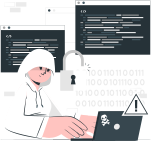
Healthcare Software Development: A Complete Guide for 2025
The global healthcare software as a service market is expected to grow to $38.50 billion in 2025. The market has been estimated for a compound annual growth rate (CAGR) of 10.50%.
The significant growth is driven by the adoption of electronic health records (EHR) and medical imaging information systems (MIIS) and the expansion of IT infrastructure.
Innovation in healthcare software development solutions enhances patient care, reduces medical errors, and automates several manual processes. For example, Electronic Health Records (EHRs) eliminate the need to manually manage various reports about each patient.
This blog explains several aspects related to building healthcare software solutions.
What is healthcare software development?
Custom healthcare software development involves building programs that can directly or indirectly improve patient care and ensure greater accuracy in the healthcare industry. These software can deliver optimum aid to various stakeholders, including patients, medical professionals, and healthcare organizations.
Some of the popular healthcare applications are telemedicine platforms, EHRs, patient portals, chronic disease management tools, etc. Let’s study what these are and how they prove helpful.
1. Electronic health record (EHR) systems
They are used to store and manage patient data and medical records in a computerized database. It improves care and outcomes by providing a comprehensive collection of patients records and can be shared with authorized healthcare professionals. it is basically an advanced electronic medical record and can also be integrated with blockchain for data security.
Popular EHRs: Cerner, Epic, AdvancedMD, NextGen, etc.
2. Telemedicine applications
These are mobile apps that allow healthcare providers and patients to communicate remotely for: consultations, diagnosis, treatment, and follow-up care. Telemedicine apps gained a significant share of the mobile health market during the Covid-19 pandemic and has become popular among doctors, patients as well as healthcare institutions.
Popular Telemedicine platforms: Doctor on Demand, Teladoc, Babylon Health, etc.
3. Hospital information systems (HIS)
Used for centralized hospital operations HIS can integrate financial, administrative, and clinical functions into a centralized database. The database stores information on patients, doctors, and staff for providing a common platform for hospital management.
HIS is a very large scale software and contains several components like Clinical Decision Support Systems (CDSS), Patient Portals, Remote Patient Monitoring (RPM), Mobile Health (mHealth) and many more.
Popular Hospital Information Systems: Medesk, Cerner, Promed, etc.
4. Healthcare CRM Software
Custom healthcare software development solutions like CRM help facilitate medical institutions to manage strong patient relationships and also enhance the quality of empathetic care towards patients.
Popular healthcare CRM software: Zendesk for Healthcare, Onpipeline, Keap, etc.
5. AI-powered Healthcare Software
Artificial intelligence in healthcare has been revolutionising diagnostics, predicting viable outcomes, and also automates several repetitive tasks. Adaptive software development solutions built with AI can make clinical processes more efficient and accurate.
Popular AI-powered healthcare software: Enlitic, PathAI, Regard, etc.
6. Revenue Cycle Management Software
Healthcare RCM software automates billing and claims management. They ensure timely service payments and significantly contributing to financial management. This ensures streamlined billing and revenue cycle for the patient and healthcare institutions.
What are the benefits of custom healthcare software development?
Custom healthcare software solutions can help you address specific needs and are built with top-quality tools that makes them secure, scalable, and flexible. These healthcare software are also designed to follow regulatory compliances like HIPAA, HL7, FHIR, DICOM, etc.
Custom healthcare software development services can benefit you in the following ways:
Better patient care: Patients can use the software for appointments, sharing reports, and communicate with doctors.
Improve data management: It provides you with a centralized database that assist with data management and analysis.
Enhance efficiency: Software can streamline administrative processes and communication. It can automate tasks like appointment scheduling, billing, etc. which can reduce errors and save time.
Improve diagnostic accuracy: AI powered healthcare software can help improve diagnostic accuracy. AI algorithms are capable of analysing medical images like X-rays, MRIs, and CT scans. This allows them to detect abnormalities and diagnose diseases more accurately and quickly. AI can often surpass human radiologists in detecting abnormalities.
Improve access to care: Healthcare software can improve access to care through telemedicine applications. Patient portals and mobile apps give patients direct access to their healthcare information.
How to build a healthcare application?
Custom healthcare software development involves stages similar to those of building any other application. This means you can implement agile SDLC models for building well-secured, user-friendly mobile apps. The process involves the following stages:
1. In-depth planning
You basically identify what problem your healthcare software will resolve. This means establishing the project goals, scope, and resources. It also involves defining the key stakeholders and collecting and documenting user needs and functional requirements.
2. Design and architecture
At this phase UI/UX designers create user interfaces that integrate functional features and also look appealing. The designers ensure that the user interface is easy to navigate and offers seamless screen transitions.
3. Frontend & backend development
Once you approve the UI designs, our team of dedicated developers starts writing code and building the software. This is the largest phase of the entire software development life cycle, and the developers transform the UI designs into functional applications using the best coding practices.
4. Testing & Launch
At this phase, the QA team ensures the software functions as intended and is free of defects. The healthcare application undergoes rigorous testing procedures, which involve both manual and automated testing processes.
Once the application passes the QA stage, it is launched on the staging server. Finally, the application is made live, and we hand over the code to you.
5. Maintenance and Updates
This is an ongoing support, with bug fixes and updates to keep the software relevant to the application users. Based on the application category, the maintenance needs can be less or more intensive.
For example, health information exchange software will require frequent updates to manage growing patient and doctor demands. Similarly, virtual health assistants like chatbots and laboratory information management systems also require frequent updates in code to ensure a seamless performance.
Conclusion
Healthcare software can be of various types depending upon what problems it resolves. Management software can improve patient satisfaction and adherence to care plans. It provides patient portals, appointment reminders, and personalized communication tools.
At Coding Sprint, a bespoke software development company, we can help you build unique web and mobile applications that enhances patient care efficiently.

